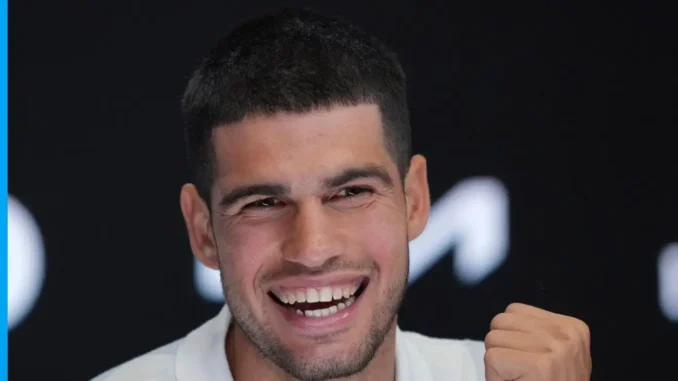
Carlos Alcaraz, the Spanish tennis prodigy whose meteoric rise has captivated the sport, isn’t just a master of jaw-dropping rallies and Grand Slam glory—he’s a thinker, too. At just 21, with four major titles already tucked under his belt, Alcaraz recently peeled back the curtain on the philosophy that fuels his game. In a candid reflection ahead of the clay-court season, he shared the heartbeat of his tennis: a blend of instinct, joy, and an unrelenting competitive spirit. But amid the brilliance, he admitted to a flaw—one he’s determined to iron out as he chases even greater heights. “In decisive moments, I follow my instinct,” he confessed. “Which, I think, is not a good thing.”
Picture Alcaraz on the court: a whirlwind of energy, flashing that trademark smile as he races from corner to corner, conjuring shots that defy logic. It’s a style that’s won him legions of fans and a trophy cabinet most players only dream of by his age. Since bursting onto the scene as a teenager, he’s claimed the 2022 US Open, the 2023 Wimbledon crown, and the 2024 French Open, cementing his status as the youngest man to hit world No. 1 in the Open Era. His game is a electrifying cocktail of aggression, creativity, and sheer athleticism—think drop shots that kiss the net and forehands that scream past opponents. Yet, beneath the flair lies a mind constantly wrestling with how to evolve.
That evolution starts with his instincts. Alcaraz thrives on the freedom to play what he feels in the moment, a trait that’s both his superpower and, as he sees it, his Achilles’ heel. “In really close moments, I do what I feel,” he explained, his voice carrying a mix of self-awareness and resolve. “I think most of the time it’s not too good, because you have to follow a strategy.” It’s a striking admission from a player who’s built a reputation on turning chaos into magic. Those split-second decisions—going for a risky winner or improvising under pressure—have delivered miracles, like his five-set comeback against Jannik Sinner at Roland Garros last year. But they’ve also cost him, as seen in his uneven start to 2025, with early exits in Miami and a semifinal stumble at Indian Wells.
Alcaraz’s journey to this realization is deeply tied to the man who’s shaped his career: Juan Carlos Ferrero, the former world No. 1 and French Open champion who’s been his coach since he was 15. Their bond goes beyond the court—Ferrero is a mentor, a confidant, and, as Alcaraz puts it, the reason he’s reached these dizzying heights. “I remember between the ages of 12 and 14 when people started to notice that I was good,” he recalled, his tone warm with gratitude. “But it’s thanks to Juan Carlos that I am here.” Together, they’ve traveled the world, weathered the grind of the ATP Tour, and built a game that’s as dynamic as it is unpredictable. Ferrero’s influence is evident in Alcaraz’s relentless work ethic and his ability to stay grounded despite the spotlight.
Yet, even with Ferrero’s guidance, Alcaraz knows there’s room to grow. His instinct-driven play has sparked debate among fans and analysts alike. When it works, it’s mesmerizing—think of his audacious shot-making in the 2023 Wimbledon final against Novak Djokovic, a match that announced him as a generational talent. But when it falters, it leaves him vulnerable, as opponents like Jack Draper have exploited in recent upsets. Alcaraz isn’t blind to this. He’s a competitor who hates losing—“I am a very competitive guy, I don’t like to lose to anyone or anything,” he declared—and he’s ready to refine his approach. The goal? Marry his natural flair with a sharper tactical edge, especially in those do-or-die moments that define champions.
Off the court, Alcaraz remains a breath of fresh air in a sport often weighed down by intensity. He’s the kid from El Palmar, Murcia, who still calls his family his anchor, who dreams of being remembered not just for titles but for his character. “At the end of my career, I would like to be remembered as a good person, a normal, natural, and happy person,” he said, his words radiating sincerity. That joy is his fuel—when he’s smiling, he’s unstoppable. “If I don’t play on instinct and if I don’t play with joy, my tennis is not the same,” he added. It’s a philosophy that’s carried him from a tennis club in Murcia, where he first fell in love with the game alongside his father, to the grandest stages in the world.
As the clay season kicks off, with the Monte Carlo Masters on the horizon, Alcaraz stands at a crossroads. The expectations are sky-high—he’s the defending French Open champ, after all, and clay is where he’s often at his best, channeling the legacy of his idol, Rafael Nadal. But this year feels different. After a 2025 that’s seen more stumbles than he’d like, he’s hungry to prove he can adapt. Will he tame his instincts and weave more strategy into his game? Or will he lean into the chaos that’s made him a star? One thing’s clear: Alcaraz isn’t just playing tennis—he’s rewriting it, one fearless swing at a time. And with Ferrero by his side, the world’s watching to see how this chapter unfolds.
Leave a Reply